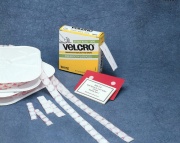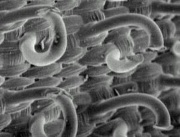Difference between revisions of "Velcro"
| Line 18: | Line 18: | ||
== Sources Checked for Data in Record == | == Sources Checked for Data in Record == | ||
| − | * | + | * Hermann Kuhn, ''Conservation and Restoration of Works of Art and Antiquities'', Butterworths, London, 1986 |
* ''Caring for your Collections'', Arthur W Schulz (ed.), Harry N. Abrams, Inc. , New York, 1992 | * ''Caring for your Collections'', Arthur W Schulz (ed.), Harry N. Abrams, Inc. , New York, 1992 | ||
| Line 24: | Line 24: | ||
* ''Fairchild's Dictionary of Textiles'', Phyllis G.Tortora, Robert S. Merkel (eds.), Fairchild Publications, New York City, 7th edition, 1996 | * ''Fairchild's Dictionary of Textiles'', Phyllis G.Tortora, Robert S. Merkel (eds.), Fairchild Publications, New York City, 7th edition, 1996 | ||
| − | * | + | * Meredith Montague, contributed information, 1998 |
| − | * | + | * Teri Hensick, contributed information, 1998 |
| − | * | + | * Website address 1 Comment: www.hants.org.uk/museums/ofr/cmeth_t.html |
* Website address 2 Comment: AMOL reCollections Glossary at http://amol.org.au/recollections/7/c/htm | * Website address 2 Comment: AMOL reCollections Glossary at http://amol.org.au/recollections/7/c/htm | ||
Revision as of 12:50, 25 November 2019
Description
[Velcro USA Inc.] A registered trademark for a reclosable fastener system patented in 1948 by George de Mestra, a Swiss inventor (patent expired in 1978). Velcro® is a two-component nylon system in which one component has hooks and the other has loops. When pressed together, the Velcro® hooks firmly grasp the loops. The two components may be separated by pulling. Velcro® produces two types of hook systems: flexible and molded. The flexible woven hooks provide maximum cycle life while the molded hooks provide maximum fastening strength with limited cyclability. Velcro® fasteners work effectively in temperatures ranging from -56C (-70F) to 93C (200F). The fasteners may be attached to substrates by sewing, heat sealing or pressure sensitive adhesives. Factory applied pressure-sensitive adhesives can be acrylic, rubber, or Polyurethane based materials.
Hazards and Safety
Nylon becomes brittle when exposed to extremely cold temperatures or ultraviolet light.
Additional Information
Velcro: Website
K.Leath, M.Brooks "Velcro and other Hook and Loop Fasteners: A Preliminary Study of Their Stability and Ageing Characteristics", TCN p.5-11
Sources Checked for Data in Record
- Hermann Kuhn, Conservation and Restoration of Works of Art and Antiquities, Butterworths, London, 1986
- Caring for your Collections, Arthur W Schulz (ed.), Harry N. Abrams, Inc. , New York, 1992
- Fairchild's Dictionary of Textiles, Phyllis G.Tortora, Robert S. Merkel (eds.), Fairchild Publications, New York City, 7th edition, 1996
- Meredith Montague, contributed information, 1998
- Teri Hensick, contributed information, 1998
- Website address 1 Comment: www.hants.org.uk/museums/ofr/cmeth_t.html
- Website address 2 Comment: AMOL reCollections Glossary at http://amol.org.au/recollections/7/c/htm

